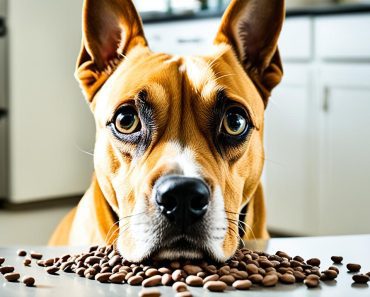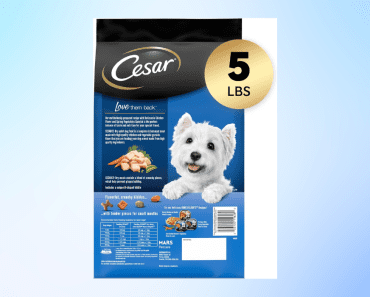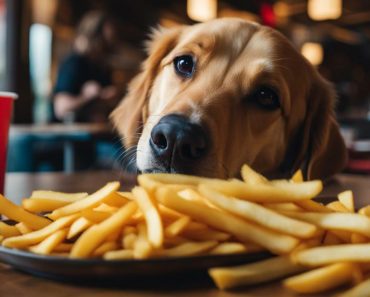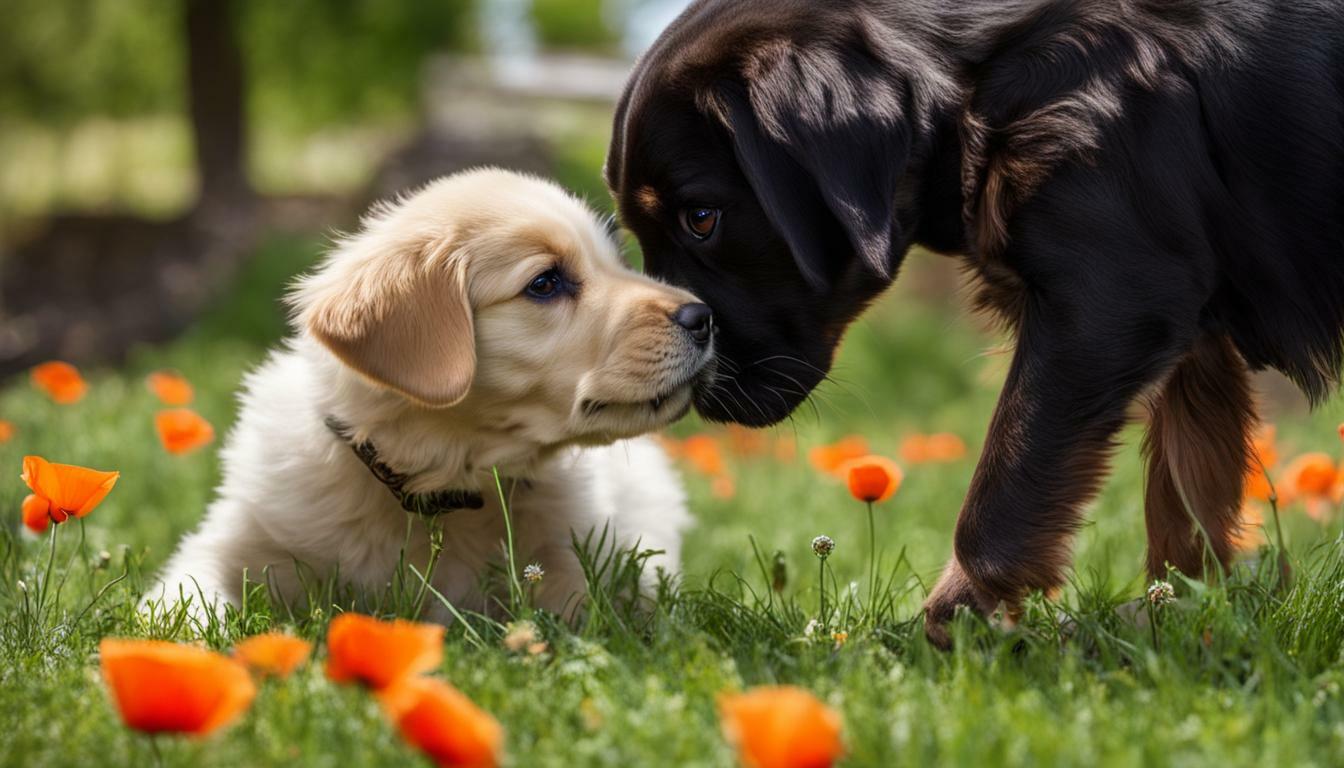
If you’ve ever wondered, “can dogs eat poppy seeds?”, it’s essential to know that these tiny treats are not safe for our furry friends. While we may enjoy these seeds in our baked goods and dishes, they can pose serious risks to dogs if ingested.
Poppy seeds are toxic to dogs and can lead to poppy poisoning, causing a range of symptoms including inappetance, pinpoint pupils, trembling, weakness, depression, sedation, respiratory depression, slowed heart rate, coma, and even death. Therefore, it is crucial to keep these seeds away from your canine companion.
Key Takeaways:
- Poppy seeds are not safe for dogs to consume and can cause poppy poisoning.
- Symptoms of poppy poisoning in dogs include inappetance, pinpoint pupils, weakness, and even coma.
- Poppies themselves are also poisonous to dogs, so it is essential to prevent access to both the plants and the seeds.
- Other foods containing poppy seeds, such as poppy seed bread and poppy seed dressing, should also be kept away from dogs to avoid potential toxicity.
- If your dog accidentally consumes poppy seeds and shows signs of poppy poisoning, it is crucial to seek veterinary care immediately.
By prioritizing your dog’s safety and avoiding poppy seeds and any foods containing them, you can ensure that your furry friend enjoys a healthy and happy life.
The Dangers of Poppy Seeds for Dogs
While poppy seeds may seem harmless to us, they can actually pose serious health risks for our canine companions. Poppy seeds are toxic to dogs and can lead to poppy poisoning, which can manifest in various symptoms. These symptoms include inappetance, pinpoint pupils, trembling, weakness, depression, sedation, respiratory depression, slowed heart rate, coma, and even death. It is crucial for dog owners to be aware of the potential dangers and take necessary precautions to keep their pets safe.
Not only are poppy seeds harmful, but the poppies themselves are also poisonous to dogs. It is important to prevent dogs from ingesting either the plants or the seeds. Additionally, foods that contain poppy seeds, such as poppy seed bread, poppy seed dressing, and poppy seed muffins, should be strictly avoided. Consumption of these foods can cause stomach upset and potential toxicity in dogs. Prevention and careful monitoring of a dog’s diet play an essential role in ensuring their overall well-being.
To illustrate the hazards, here is a table summarizing the potential health effects of poppy seeds on dogs:
| Symptoms | Risks |
|---|---|
| Inappetance | Loss of appetite and decreased food intake |
| Pinpoint pupils | Abnormally constricted pupils |
| Trembling | Involuntary shaking or trembling |
| Weakness | Lack of strength and energy |
| Depression | Sustained sadness or low mood |
| Sedation | Excessive sleepiness or drowsiness |
| Respiratory depression | Slowed breathing rate |
| Slowed heart rate | Decreased heart rate |
| Coma | Unconscious state |
| Death | Fatal outcome |
“It is best to keep dogs away from poppy seeds and any foods containing them to ensure their safety.”
As responsible pet owners, we must prioritize the well-being of our furry friends. To avoid any potential harm, it is crucial to be cautious and keep poppy seeds and foods containing them out of a dog’s reach. By doing so, we can ensure that our beloved companions stay healthy and happy.
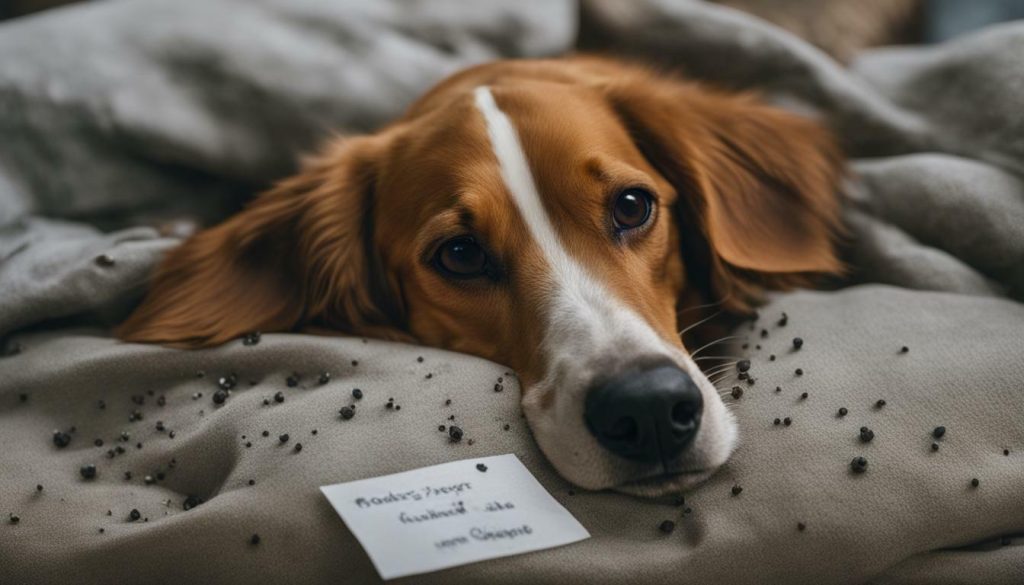
Symptoms of Poppy Poisoning in Dogs
Dogs that ingest poppy seeds or suffer from poppy poisoning may display various symptoms that indicate a potential health emergency. It is crucial for pet owners to be aware of these signs and seek immediate veterinary care if their dog exhibits any of the following:
- Inappetance: Loss of appetite or refusal to eat
- Pinpoint pupils: Constricted pupils that appear smaller than usual
- Trembling: Shaking or trembling of the body or limbs
- Weakness: Lethargy or lack of energy
- Depression: Persistent sadness or low mood
- Sedation: Excessive sleepiness or drowsiness
- Respiratory depression: Slowed breathing or difficulty breathing
- Slowed heart rate: Abnormally slow heart rate
- Coma: Unconsciousness or inability to wake up
- Death: In severe cases, poppy poisoning can be fatal
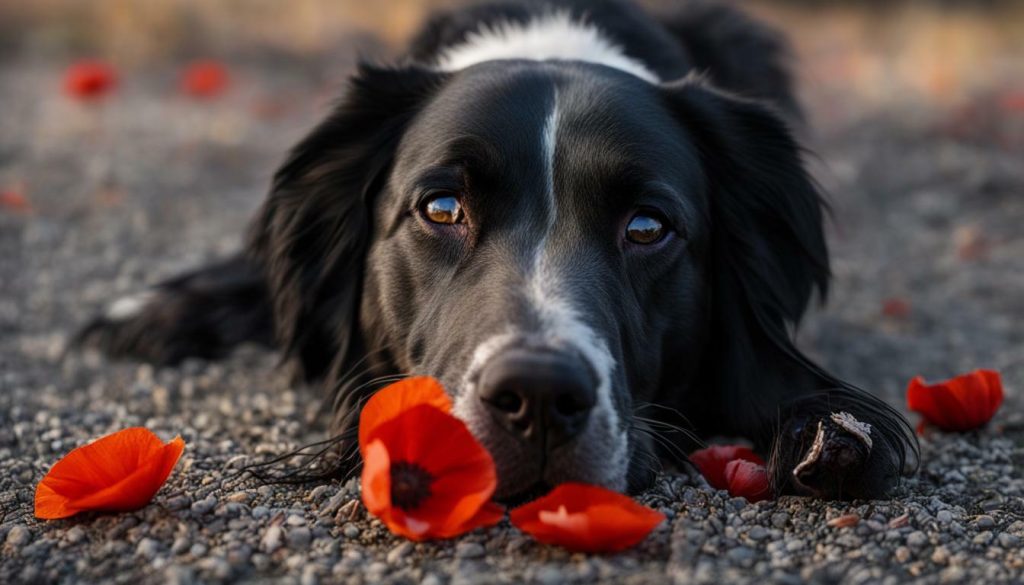
If you suspect that your dog has ingested poppy seeds or is experiencing poppy poisoning, do not delay in seeking veterinary help. Early detection and prompt treatment are essential to improve the chances of a positive outcome. Remember to provide your veterinarian with all the necessary information, including the quantity of poppy seeds consumed and the time of ingestion. This will assist in determining the appropriate course of action and potential interventions to ensure your dog’s well-being.
As a responsible pet owner, it is crucial to keep poppy seeds and any foods containing them out of your dog’s reach. Preventing access to poppy plants and foods with poppy seeds is the best way to avoid the risk of poppy poisoning. Always be cautious and mindful of the substances your dog may come into contact with, and consult with your veterinarian if you have any concerns or questions regarding your dog’s diet or potential poisoning hazards.
Poppies and Other Foods with Poppy Seeds to Avoid
It’s crucial to keep dogs away from poppy seeds and any foods or plants that contain them for their well-being and safety. Poppy seeds are toxic to dogs and can lead to poppy poisoning, causing a range of symptoms such as inappetance, pinpoint pupils, trembling, weakness, depression, sedation, respiratory depression, slowed heart rate, coma, and even death. If you notice any of these signs in your dog, it’s imperative to seek immediate veterinary attention to ensure their health and recovery.
Not only are poppy seeds hazardous for dogs, but the poppy plants themselves are also toxic. Therefore, it’s important to prevent your furry friend from ingesting any part of the plant. Additionally, foods that contain poppy seeds, like poppy seed bread, poppy seed dressing, and poppy seed muffins, should be kept away from dogs. Consuming these foods can result in stomach upset and potential toxicity. To keep your dog safe and healthy, be proactive in avoiding poppy seeds and any food items that may contain them.
Here’s a comprehensive table summarizing some common foods and plants to avoid:
| Food/Plant | Potential Risks |
|---|---|
| Poppy seeds | Toxicity, poppy poisoning |
| Poppy plants | Toxicity |
| Poppy seed bread | Stomach upset, potential toxicity |
| Poppy seed dressing | Stomach upset, potential toxicity |
| Poppy seed muffins | Stomach upset, potential toxicity |
By being mindful of what foods and plants are harmful to your dog, you can ensure their well-being and prevent any potential health complications. Always prioritize their safety by keeping poppy seeds and related products out of their reach.
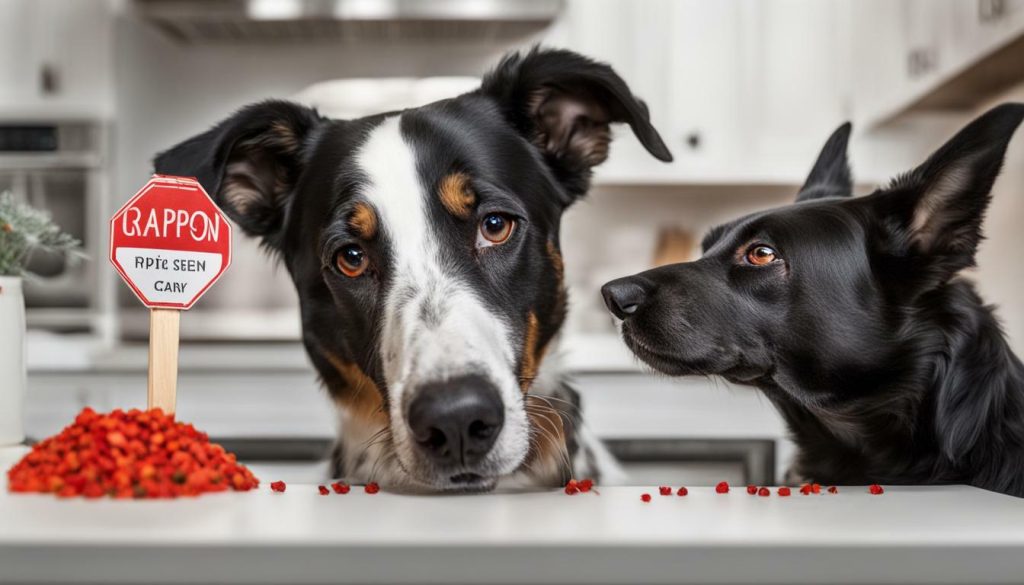
What to Do If Your Dog Ingests Poppy Seeds
If your dog ingests poppy seeds or exhibits symptoms of poppy poisoning, it is crucial to act quickly and seek veterinary assistance. Here are the steps you can take to ensure your dog’s safety:
- Stay calm: It’s natural to panic when you realize that your dog has consumed poppy seeds, but staying calm is important for making rational decisions.
- Contact your vet: Immediately reach out to your veterinarian and inform them about the situation. They will provide guidance based on your dog’s size, weight, and the amount of poppy seeds ingested.
- Monitor your dog: Keep a close watch on your dog’s behavior and look out for any symptoms of poppy poisoning mentioned earlier. Note down any changes in their appetite, energy levels, or overall well-being.
- Provide all necessary information: When speaking to your vet, provide them with accurate details about the type of poppy seeds consumed, the quantity, and the time of ingestion. This information will help them assess the severity of the situation and determine the appropriate treatment.
- Follow your vet’s advice: Your veterinarian may advise you to induce vomiting or bring your dog in for examination and treatment. It is vital to follow their instructions carefully, as they have the expertise to handle such situations effectively.
Remember, prompt action is crucial in cases involving poppy seed ingestion. By seeking immediate veterinary help, you can ensure the well-being and safety of your beloved furry friend.
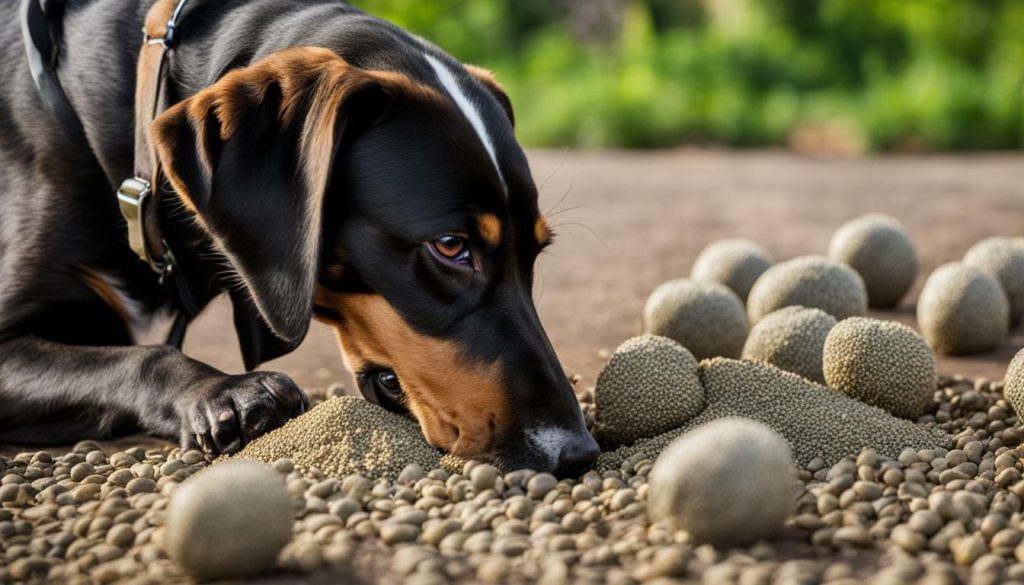
Safe Alternatives for Your Dog’s Treats
While poppy seeds are off-limits for dogs, there are plenty of other delicious and pet-friendly treats you can offer them. These alternatives not only provide a tasty snack but also ensure the safety and well-being of your furry friend. Here are some dog-friendly foods that will leave those tails wagging with delight:
- Peanut Butter: A classic favorite among canines, peanut butter is a great source of protein and healthy fats. Look for peanut butter brands that do not contain xylitol, as this ingredient is toxic to dogs.
- Carrots: Crunchy and low in calories, carrots make the perfect snack for dogs. They are packed with vitamins and minerals, including beta-carotene, which promotes healthy eyesight.
- Blueberries: These small, antioxidant-rich fruits are not only tasty but also offer numerous health benefits for dogs. They can help boost the immune system and improve cognitive function.
- Sweet Potatoes: Rich in fiber and vitamins A, C, and B6, sweet potatoes are a nutritious alternative to processed dog treats. They can be baked or dehydrated for a chewy texture that dogs love.
Remember to always introduce new foods gradually and in moderation to avoid any digestive upsets. Additionally, consult with your veterinarian before making any significant changes to your dog’s diet to ensure their specific nutritional needs are met.
By offering these safe alternatives, you can provide your dog with a variety of flavors and textures while maintaining their overall health and well-being. Remember, a happy and healthy pup is a treat in itself!
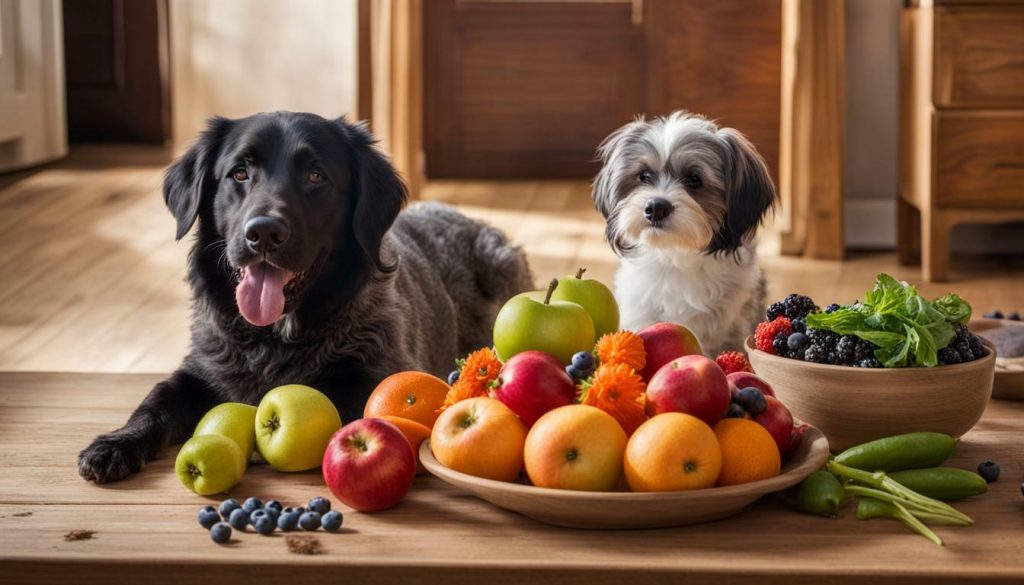
Summary:
While poppy seeds are toxic to dogs and should be avoided, there are many other delicious and pet-friendly treats you can offer your furry friend. Peanut butter, carrots, blueberries, and sweet potatoes are just a few examples of nutritious and tasty alternatives that will satisfy your dog’s cravings. Remember to introduce new foods gradually and consult with your veterinarian to ensure your dog’s specific dietary needs are met. By providing these safe alternatives, you can keep your dog happy and healthy while enjoying their favorite snacks.
Conclusion
In conclusion, it is crucial to note that poppy seeds are not safe for dogs to consume, and they should be kept out of reach to ensure the well-being and safety of our furry friends. Poppy seeds are toxic to dogs and can cause poppy poisoning, which can lead to severe symptoms such as inappetance, pinpoint pupils, trembling, weakness, and even coma or death. Therefore, it is important to avoid feeding dogs any foods that contain poppy seeds, including poppy seed bread, poppy seed dressing, and poppy seed muffins.
Poppies themselves are also poisonous to dogs, so it is essential to prevent dogs from eating both the plants and the seeds. If your dog accidentally ingests poppy seeds or shows any signs of poppy poisoning, it is crucial to seek immediate veterinary care. Only a professional can determine the severity of the poisoning and provide the necessary treatment for your beloved pet.
It is always better to be safe than sorry when it comes to your dog’s diet. Instead of offering poppy seeds or any foods containing them, consider providing safe alternatives for your dog’s treats. There are plenty of dog-friendly foods that can be incorporated into their diet, ensuring they receive tasty and nutritious treats without the risks associated with poppy seeds.
Remember, as responsible pet owners, it is our duty to keep our dogs safe and healthy. By being aware of the potential dangers of poppy seeds and avoiding them in our dogs’ diet, we can prevent unnecessary harm and ensure their well-being. So, let’s keep poppy seeds away from our furry companions and choose safer alternatives for their munchies.
FAQ
Can dogs eat poppy seeds?
No, poppy seeds are toxic to dogs and can cause poppy poisoning.
What are the symptoms of poppy poisoning in dogs?
Symptoms of poppy poisoning in dogs include inappetance, pinpoint pupils, trembling, weakness, depression, sedation, respiratory depression, slowed heart rate, coma, and even death.
Are poppies themselves poisonous to dogs?
Yes, poppies themselves are poisonous to dogs, so they should not eat the plants or the seeds.
Can dogs eat foods that contain poppy seeds?
No, other foods that contain poppy seeds, such as poppy seed bread, poppy seed dressing, and poppy seed muffins, should also be kept away from dogs as they can cause stomach upset and potential toxicity.
What should I do if my dog ingests poppy seeds?
If your dog ingests poppy seeds and shows signs of poppy poisoning, it is important to take them to the veterinarian immediately for treatment.
What are some safe alternatives for my dog’s treats?
There are many safe and healthy alternatives to poppy seeds that you can incorporate into your dog’s diet, such as carrots, apples, peanut butter, and lean meats. Always consult with your veterinarian for specific recommendations.


